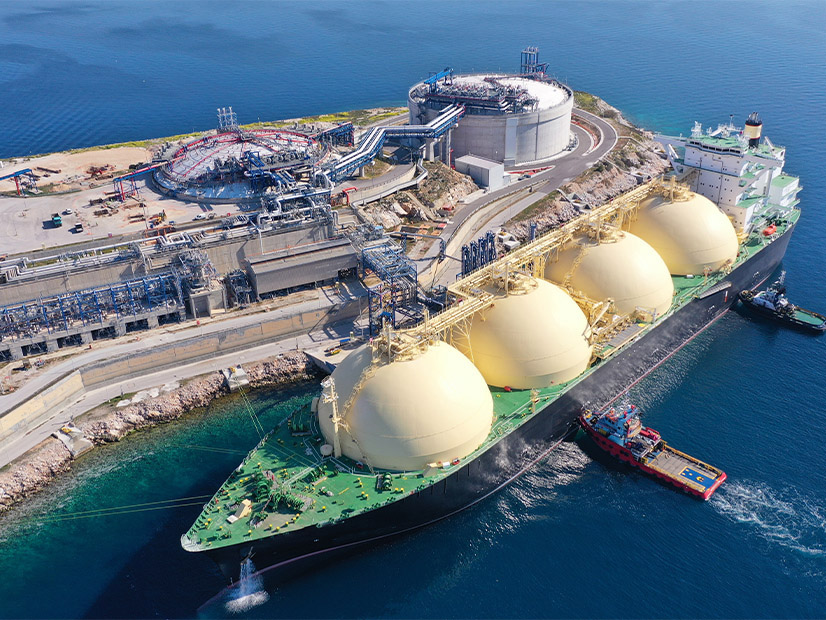In a new statement released Monday, ISO-NE and many of its gas and electric distributors warned that the region’s near-term grid reliability depends on its access to LNG — and that access to LNG in turn relies on a single facility outside Boston.
The message comes ahead of a summit next week that will bring FERC commissioners and staff to Vermont to discuss the tenuous state of the region’s grid this winter and in the coming years.
The statement published by the RTO says that weaning New England off its dependence on imported LNG remains its long-term goal, as the region transitions to more renewable generation.
But in the short term, an LNG import facility operated by Constellation Energy in Everett, Mass., is vital to keeping the lights on, it says.
“The region must ensure the continued operation of the Everett LNG Facility to maintain reliable electric and natural gas service for New England consumers,” ISO-NE and the distributors said.
Everett can store the equivalent of 3.4 Bcf of natural gas and has the equipment needed to import, store, transport and re-gasify LNG. It can deliver up to 435 MMcfd to two of the five pipelines used by generators and gas utilities in New England.
The fate of the Everett facility is tied to the attached Mystic Generating Station, which ISO-NE has paid to retain until its retirement in 2024.
In a separate news release, ISO-NE CEO Gordon van Welie called energy adequacy “under-appreciated, poorly understood, but vitally important.”
“By raising awareness of this issue ahead of the upcoming forum, ISO New England and the region’s utilities hope to begin the process of developing a strong, coordinated response with the New England states, NEPOOL and regional stakeholders to assure that energy adequacy is consciously addressed as the region charts a course toward a clean power system,” van Welie said.
The utilities joining ISO-NE in issuing the statement were Avangrid, Eversource Energy, Liberty Utilities, National Grid, Rhode Island Energy and Vermont Electric Co.
Kickstarting Solutions
The aim of the forum next week is to start hashing out solutions to New England’s unique but well documented challenges around gas supply. Aiming to kick off the conversation, ISO-NE put forward a few ideas in its statement Monday.
For one, the grid operator called on the region to “undertake a comprehensive study of both the energy adequacy problem and the potential solutions for addressing the problem.”
ISO-NE shouldered its own responsibility and acknowledged that any changes to its tariff will have to go through NEPOOL and FERC, but it also called on the states to hold up their end of the bargain.
“The New England states have a major role in determining the nature and extent of any regional risk mitigation solution, since they represent the end consumers who will have to pay for the insurance, and further, control the siting and permitting of the necessary infrastructure,” the statement says.
The RTO also put new weight behind the idea of an energy reserve, which was raised recently by the New England states in a request to the Biden administration. (See New England Governors Ask Feds for Help with Winter Reliability.)
“An energy reserve would cover unusual events, including combinations of major contingencies or extreme weather or both,” ISO-NE said, likening it to regionwide insurance.
The grid operator said a reserve could come in a few different forms: state-regulated cost-of-service infrastructure investments coupled with contracting for the energy; FERC-regulated cost-of-service rates for recovering infrastructure investments and forward energy supply chain arrangements; or FERC-regulated wholesale electric market tariffs to incentivize investment.
“At this stage, given the region’s experience over the past two decades, the region needs to determine how much insurance to buy and which options, or combinations of options, will be the most effective and efficient,” the grid operator said.
All in the Same Room
The forum next week — an all-day affair in Burlington, Vt., on Thursday — will feature nearly 30 panelists from the states, FERC, ISO-NE, distribution and pipelines companies, and more.
According to FERC, it’s intended to “achieve greater consensus or agreement among stakeholders in defining the electric and natural gas system challenges in New England and identify what, if any, steps are needed to better understand those challenges before identifying solutions.”
ISO-NE and the states, in particular, have been lobbing barbs back and forth for years over who holds responsibility for solving the problems facing the region.
Even in the unlikely event of a breakthrough or consensus on Thursday, it’s likely too late to make changes that could help steady the grid this winter: ISO-NE has already said it won’t take steps to stockpile fuel, and that rolling blackouts could be on the horizon if the region sees an extended period of extreme cold. (See ISO-NE Says No Extra Winter Programs Make Sense this Year.)



